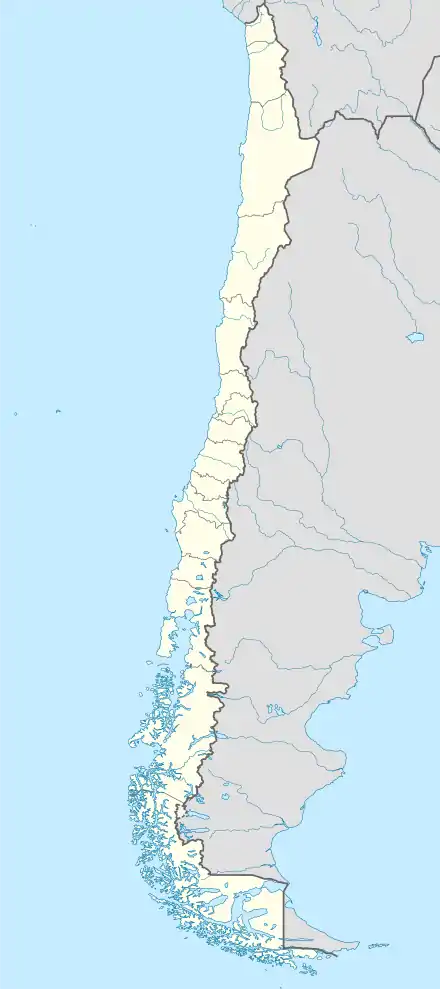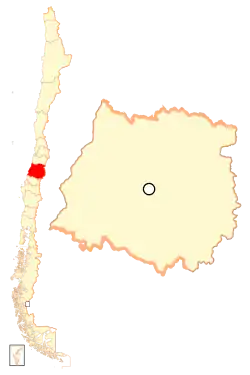Hualañé
Hualañé (Spanish pronunciation: [walaˈɲe]) is a town and commune of the Curicó Province in Chile's seven region of Maule.
Hualañé | |
|---|---|
 Coat of arms  Map of Hualañé commune in the Maule Region  Hualañé Location in Chile | |
| Coordinates (type): 34°58′35.52″S 71°48′17.23″W | |
| Country | Chile |
| Region | Maule |
| Province | Curicó |
| Government | |
| • Type | Municipality |
| • Alcalde | Claudio Pucher |
| Area | |
| • Total | 629.0 km2 (242.9 sq mi) |
| Elevation | 22 m (72 ft) |
| Population (2012 Census)[2] | |
| • Total | 9,303 |
| • Density | 15/km2 (38/sq mi) |
| • Urban | 5,198 |
| • Rural | 4,543 |
| Demonym(s) | hualañesino |
| Sex | |
| • Men | 5,059 |
| • Women | 4,682 |
| Time zone | UTC-4 (CLT [3]) |
| • Summer (DST) | UTC-3 (CLST [4]) |
| Area code(s) | 56 + 75 |
| Website | Municipality of Hualañé |
Situated in the Mataquito River valley, its main activities are the agriculture of tomatoes, potatoes, and grapes for wine. The commune spans an area of 629.0 km2 (243 sq mi).[2]
Demographics
According to the 2002 census of Population and Housing by the National Statistics Institute (Instituto Nacional de Estadísticas or INE) the Hualañé commune had 9,741 inhabitants; of these, 5,198 (53.4%) lived in urban areas and 4,543 (46.6%) in rural areas. At that time, there were 5,059 men and 4,682 women. The population grew by 4.8% (443 persons) between the 1992 and 2002 censuses.[2]
Administration
As a commune, Hualañé is a third-level administrative division of Chile administered by a municipal council, headed by an alcalde who is directly elected every four years. The 2008-2012 alcalde is Claudio Pucher.[1]
Within the electoral divisions of Chile, Hualañé is represented in the Chamber of Deputies by Mr. Roberto León (PDC) and Mr. Celso Morales (UDI) as part of the 36th electoral district, (together with Curicó, Teno, Romeral, Molina, Sagrada Familia, Licantén, Vichuquén and Rauco). The commune is represented in the Senate by Juan Antonio Coloma Correa (UDI) and Andrés Zaldívar Larraín (PDC) as part of the 10th senatorial constituency (Maule-North).
References
- "Municipality of Hualañé" (in Spanish). Retrieved 13 December 2010.
- "National Statistics Institute" (in Spanish). Retrieved 28 July 2010.
- "Chile Time". WorldTimeZones.org. Archived from the original on 2007-09-11. Retrieved 2010-07-28.
- "Chile Summer Time". WorldTimeZones.org. Archived from the original on 2007-09-11. Retrieved 2010-07-28.
External links
- (in Spanish) Municipality of Hualañé
